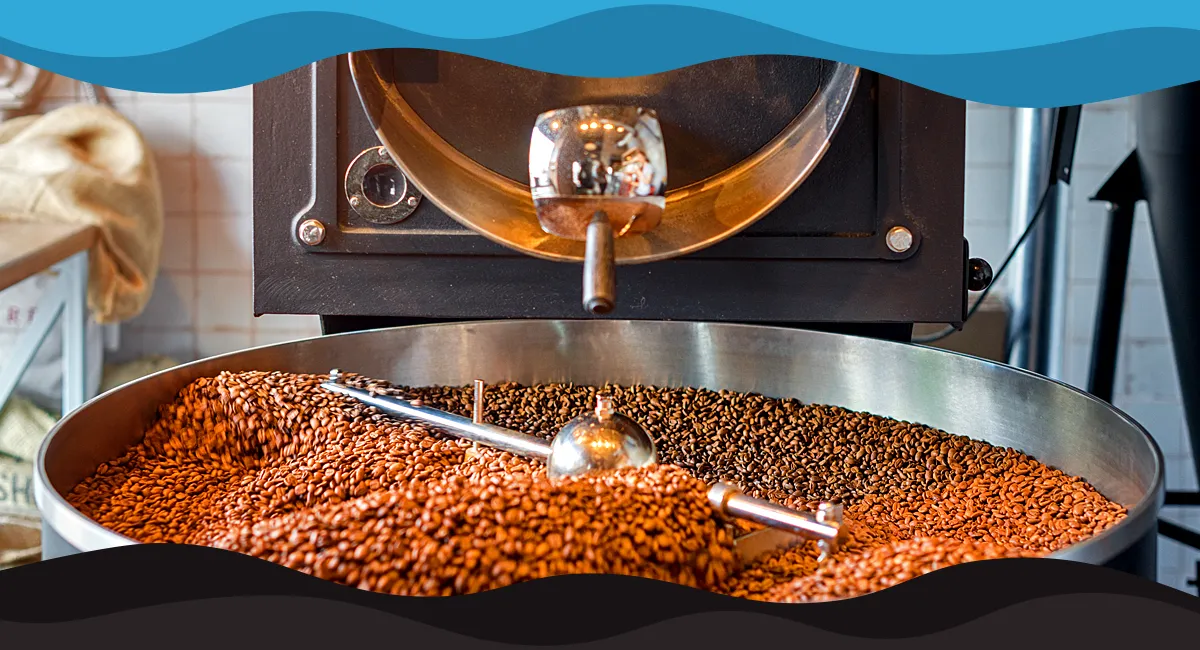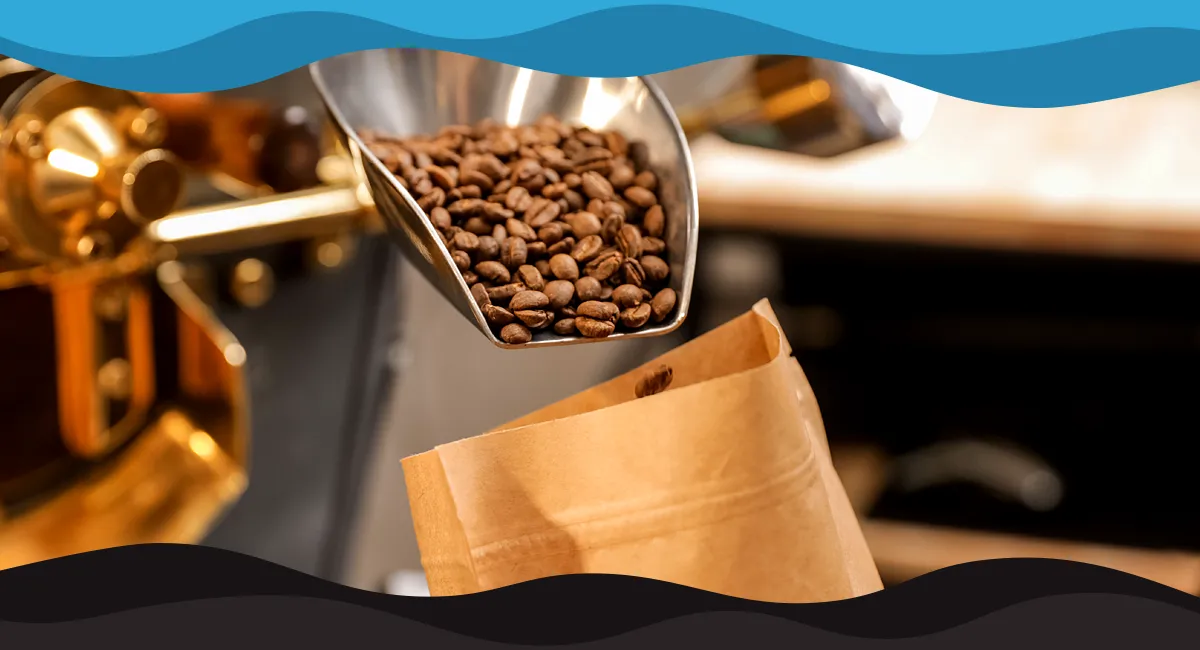Why Quality Matters:
How to Find Great
Wholesale Coffee Beans
The coffee you serve says a lot about your business. In cafés, hotels, and restaurants, it’s often one of the most ordered items on the menu (and one of the things guests remember most). A great cup can leave a lasting impression, keep customers coming back, and build a reputation for quality. But on the flip side, a poor one can do the opposite.
For decision-makers responsible for sourcing, wholesale coffee beans should be regarded as a critical investment. The calibre of the beans determines not only flavour and aroma, but also brewing consistency, staff efficiency, and ultimately the financial performance of the business.
Key Takeaways
-
Coffee bean quality directly impacts flavour, consistency, and customer loyalty, making it a critical investment for cafés, hotels, and restaurants.
-
Evaluating beans through cupping, aroma checks, and third party reviews ensures sourcing decisions are based on measurable quality, not assumptions.
-
Serving exceptional coffee strengthens brand reputation, improves operational efficiency, and helps businesses stand out in a competitive market.
-
Affordable, high-quality beans deliver better results than low-grade alternatives, reducing waste and maximising profit margins.
In this guide we’ll explore why coffee bean quality matters, how to evaluate it when purchasing wholesale, and why partnering with a reliable supplier can help businesses not only achieve a great ROI on their coffee, but deliver excellence in every cup.

The Business Case for Prioritising Quality
In the highly competitive hospitality market, coffee is one of the most frequently ordered products and a defining part of the customer experience. The quality of the beans you choose therefore has a direct impact on taste, consistency, and ultimately, the perception of your brand.
Coffee Quality Shapes Customer Experience
The beans you serve directly affect flavour, aroma, and consistency in every cup. Premium beans enhance the customer experience and build trust in your brand. Guests who enjoy consistently well-crafted coffee are more likely to:
-
Return regularly
-
Recommend your business
-
Associate your brand with professionalism and care
Low-grade beans, on the other hand, risk disappointment, dissatisfaction, and ultimately, a decline in loyalty.
The False Economy of Low-Grade Beans
At first glance, buying lower-grade beans may seem like a cost-saving measure. In reality, it often leads to:
-
Bitter or unbalanced brews
-
Higher waste and drink re-makes
-
Increased reliance on milk, sugar, or syrups to mask poor flavour
-
Lost revenue as customers take their business elsewhere
By contrast, sourcing high-quality beans from the right supplier ensures greater brewing consistency, reduces inefficiencies, and maximises the return on every kilo purchased. With a supplier who delivers both quality and value, by providing high quality coffee at a discount, businesses can achieve stronger customer retention and healthier margins without paying a premium price.
The Pitfall of a Price-First Mindset
One of the most common mistakes in wholesale buying is treating coffee as a commodity. A price-driven approach often results in:
-
Inconsistent supply
-
Variable flavour profiles
-
Long-term reputational damage
Prioritising bean quality positions your business for long-term success in a market where customer expectations are continually rising.

Key Elements That Define Coffee Bean Quality
For cafés, hospitality venues, and restaurants, selecting the right beans is a strategic decision that directly influences customer satisfaction and operational performance. While coffee quality can be complex, there are several practical markers you can use to make informed choices when buying wholesale.
1. Origin and Traceability
The story of a coffee bean begins at its origin. High-quality beans typically come from well-documented regions, grown at optimal altitudes and climates that enhance flavour development. A trustworthy supplier will always provide clear details about origin, processing methods, and farming practices, allowing you to ensure consistency and authenticity in your offering.
2. Bean Appearance and Uniformity
Visual inspection can reveal a lot about quality. Premium beans are uniform in size, shape, and colour, which ensures even roasting and predictable results. Bags that contain broken, uneven, or discoloured beans often signal lower-grade stock or poor handling practices, which can compromise flavour.
3. Processing Method
The way coffee cherries are processed after harvest plays a decisive role in defining the beans’ flavour profile and overall quality. Processing is essentially how the fruit is removed and how the beans are dried, and each method imparts distinct characteristics:
-
Washed (Wet) Processing: Produces a clean, bright cup with pronounced acidity and clarity of flavour. This method requires precision and resources, and is often associated with higher-grade coffees.
-
Natural (Dry) Processing: The beans are dried inside the fruit, resulting in fuller-bodied coffees with sweet, fruity, or wine-like notes. While it can create exceptional flavours, poor handling during drying can lead to inconsistency or defects.
-
Honey (Semi-Washed) Processing: A hybrid approach where some of the fruit mucilage remains during drying, producing a balance of sweetness and clarity.
When assessing wholesale beans, ask your supplier about the processing methods used and whether they work with producers who apply rigorous quality control at this stage.
4. Roast Method and Quality
Roast quality plays a defining role in coffee character. Even, well-developed roasts highlight the bean’s natural qualities, while underdeveloped roasts can taste sour and over-roasted beans often result in flat or burnt flavours.
The roasting method itself also makes a difference. While traditional drum roasting relies on conductive heat from the drum surface, convection roasting uses hot air to roast the beans more evenly. Convection roasting typically delivers superior consistency, avoids scorching, and allows the beans’ natural characteristics to shine through. This method preserves nuance in flavour and produces a cleaner, more balanced cup compared with conventional conductive roasting.
5. Freshness and Sensory Appeal
The condition of the beans after roasting is one of the clearest indicators of quality. Freshness is critical, as coffee is at its best within 2–6 weeks of roasting, when the natural oils and aromatics are still vibrant. Always look for a roast date rather than a distant “best before” label, and whenever possible, source from suppliers who roast in smaller, regular batches to maintain peak flavour.
Sensory evaluation is the most immediate way to judge freshness and quality. High-quality beans release an appealing aroma (whether floral, fruity, nutty, or chocolatey) that hints at complexity. By contrast, stale or poor-quality beans often smell flat, dull, or overly burnt.
6. Supplier Standards and Certifications
Beyond the beans themselves, quality is reinforced by supplier standards. Professional suppliers work within speciality grading frameworks and may also provide certifications such as Fair Trade, Organic, or Rainforest Alliance. These credentials not only help assure bean quality but also align with customer expectations around sustainability and ethical sourcing.
Independent, third-party recognition also provides valuable reassurance. Accolades such as the Great Taste Awards demonstrate that a product has been rigorously assessed for flavour and quality by industry experts. Equally important is recognition of a supplier’s service levels; businesses benefit from partners who not only deliver excellent coffee but also provide reliability, support, and consistent customer care.

Tasting for Quality: How to Evaluate Beans Before You Buy
Before committing to a wholesale order, it’s important to test and verify quality in practice.
-
Cupping: The industry standard for evaluation. Taste for acidity, body, balance, and finish to identify clean, distinctive flavours and avoid hidden defects.
-
Supplier Samples: Request or order samples and, where possible, look at supporting data such as moisture content, third-party reviews, or cupping scores to confirm consistency.
-
Aroma & Grind Check: Fresh beans should have a rich, appealing aroma and produce a clean, even grind without excess dust or fragmentation.
-
Team Taste Tests: Run blind tastings with your staff to remove bias and gather collective feedback, ensuring the chosen beans meet customer expectations.
-
Spot Low Quality Beans: Flat or musty aroma, harsh bitterness, or oily, stale beans are warning signs of lower-grade stock.

Supplier Red Flags: When Quality Is in Question
Selecting a supplier is as important as choosing the beans themselves, and certain warning signs should not be overlooked.
-
Inconsistent batches, where flavour, roast level, or aroma vary from one order to the next, point to poor quality control and can undermine customer trust.
-
A lack of transparency is another red flag; if a supplier is unwilling to share details about origin, processing methods, or roast dates, it suggests a lack of accountability in their sourcing and handling.
-
Be cautious, too, of suppliers who promote price above all else. While cost is of course a very important factor to helping coffee businesses achieve a good ROI, a price-first or price-only focus (without consideration for product quality) often indicates that corners are being cut, which usually comes at the expense of flavour and consistency.
-
Poor roasting practices are another warning sign, often evident in beans that appear overly oily, unevenly roasted, or burnt in flavour.
-
Finally, consider the level of support offered. A supplier who simply delivers coffee without providing the customer service to back up their products is unlikely to be invested in your long-term success.

Premium Coffee Brands vs. Specialist Suppliers
For many businesses, big-name brands such as Lavazza offer reassurance through recognition and consistency. Customers may already know these names, and their global presence provides credibility. At the same time, choosing in-house beans from a specialist gives you access to award-winning blends, fresh small-batch roasting, and the flexibility to tailor coffee to your business needs.
Factor
Premium Brands (e.g Lavazza)
Specialist Brand (e.g. PureGusto)
Brand Recognition
Widely recognised and trusted globally.
Build your own coffee identity while backed by award-winning quality.
Consistency
Large-scale supply ensures uniform products worldwide.
Small-batch roasting provides freshness and precise quality control.
Flavour Range
Iconic blends with broad appeal, reassuringly familiar.
Exclusive blends and single-origins offering variety and distinction.
Flexibility
Fixed blends and established pricing structures.
More adaptable supply options with a focus on your business needs.
Support & Training
Brand-led resources and marketing support.
Personalised training, brewing advice and close supplier partnership.
Value for Money
Pricing often reflects brand prestige and global recognition.
Competitive pricing with emphasis on freshness, award-winning quality, and genuine value.
Browse Products:

Why Great Beans Are Worth the Investment
High-quality coffee beans should be seen not just as an ingredient but as a long-term driver of customer satisfaction, efficiency, and profitability. Every cup of coffee you serve is a reflection of your business, and the calibre of the beans determines whether that reflection inspires confidence or disappointment.
When sourced from the right supplier, premium beans provide this consistency at excellent value, helping you maximise both quality and cost-effectiveness. From an operational perspective, great beans also mean better espresso yields. With consistent density and roast quality, they extract more reliably, resulting in less waste and fewer drinks that need to be remade. This consistency supports smoother service and maximises the value of every kilo of coffee purchased.
Crucially, serving exceptional coffee strengthens your brand. Customers increasingly associate quality coffee with professionalism and attention to detail, whether in a café, hotel, or restaurant. Businesses that prioritise bean quality set themselves apart from competitors, positioning their coffee offering as a cornerstone of the guest experience rather than a commodity.

Ready to Serve Better Coffee?
Even when you understand what defines coffee quality and how to evaluate it, choosing the right wholesale beans for your business can still feel complex. But you don’t have to make that decision alone.
At PureGusto, our expert team can help you:
-
Select the right beans to match your customer profile and menu style
-
Compare premium brands like Lavazza with our award-winning PureGusto range
-
Understand the differences between blends, single origins, and processing methods
-
Ensure consistency across large orders with expert quality control
-
Optimise value by working with a supplier who delivers premium quality beans at competitive wholesale prices.
We offer a wide range of premium wholesale coffee beans, including globally recognised brands and our own Great Taste Award-winning PureGusto blends and single-origin roasts. All are available with flexible supply options and the backing of a dedicated team who understand the challenges of running a busy hospitality business.
For more information or tailored advice, contact us today. Or browse our full range of wholesale beans to find the perfect fit for your business.

FAQs About Coffee Bean Quality
Q: Why Does Coffee Bean Quality Matter So Much In Hospitality?
A: Coffee often acts as a benchmark for the overall standards of a business. Guests may forgive a small error in service or food, but a poor cup of coffee lingers as a negative impression. High-quality beans ensure that the coffee experience reflects professionalism and care, rather than corner-cutting.
Q: Why Should I Involve My Team In Evaluating Beans?
A: We encourage our clients to bring their staff into the evaluation process. Not only does this create objectivity when choosing beans, but it also trains your team to speak knowledgeably about the coffee you serve. That confidence is passed directly to your customers, enhancing the experience in ways that go beyond the cup.
Q: How do storage and handling affect bean quality?
A: Even the best beans deteriorate if stored poorly. Wholesale beans should be kept airtight, away from heat, light, and moisture to preserve freshness.
Q: What role does sustainability play in coffee quality?
A: Sustainably sourced beans are often higher quality because they come from farms that invest in careful cultivation and processing. Certifications can also help reassure customers about your values.
Q: Aren’t cheaper beans more cost-effective for high-volume businesses?
A: In our experience, the opposite is true. Cheaper beans tend to result in more waste, higher staff training costs, and lower customer retention. Premium beans consistently yield better extractions, which means you get more cups of coffee per kilo and happier customers with fewer complaints. But premium doesn’t have to mean expensive, which is why we work hard to deliver both great quality and great value.
